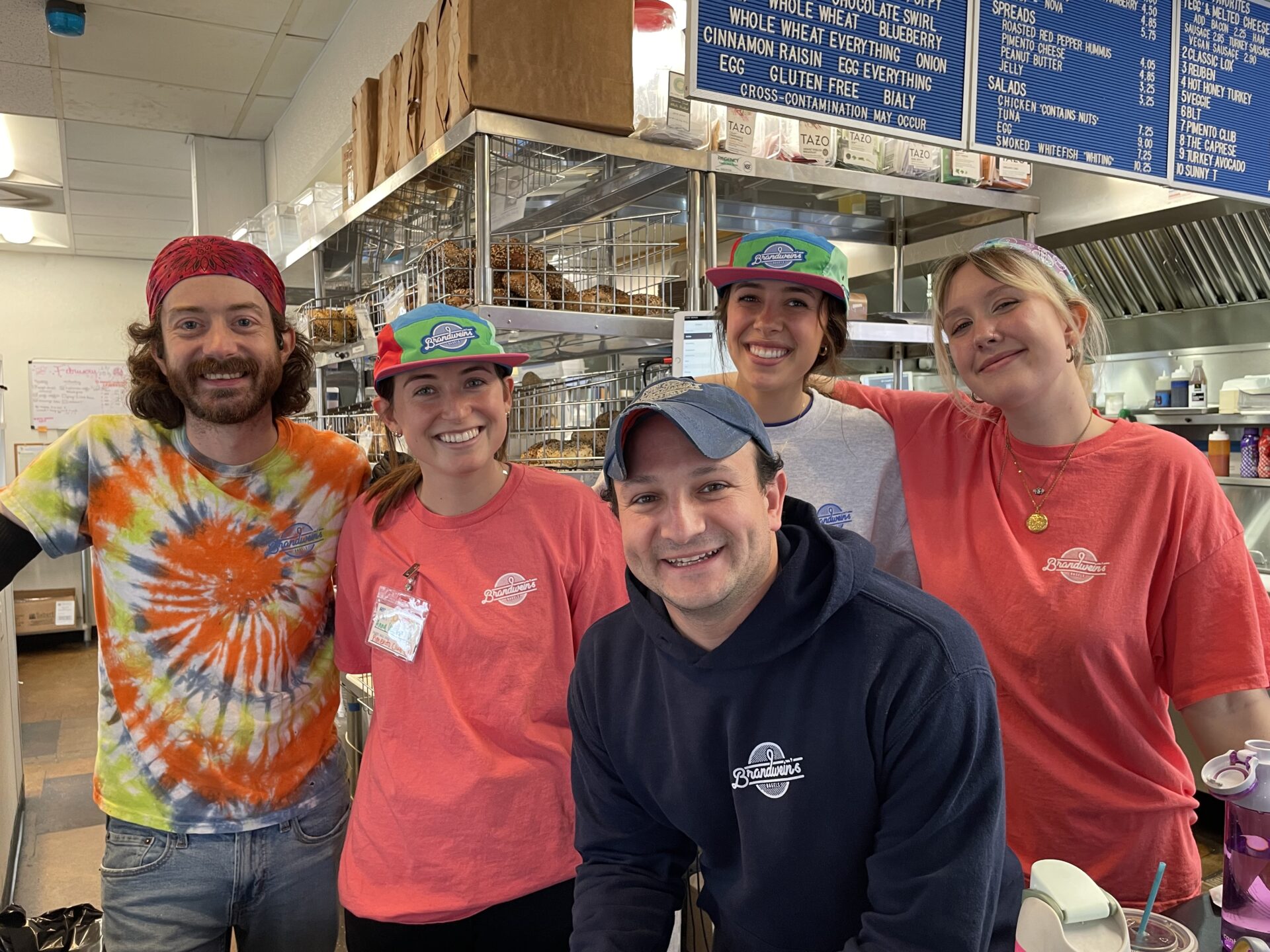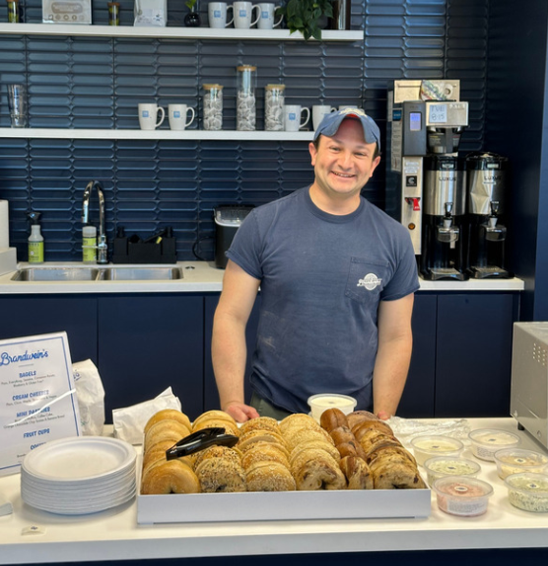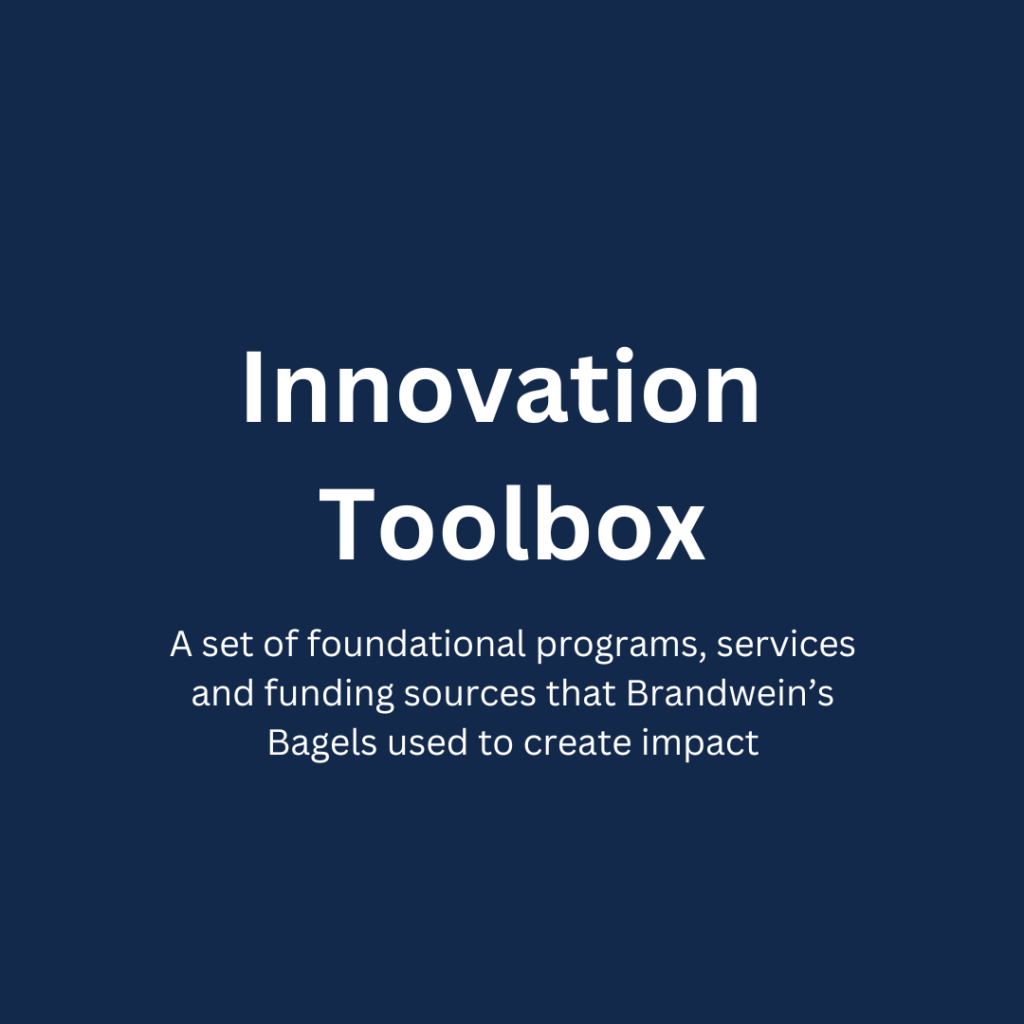The brick-and-mortar grand opening of Brandwein’s Bagels in 2020 was a great triumph from the outside, selling out before noon, but teetered on disaster from the inside for founder Alex Brandwein. The day was filled with “so many mistakes,” that Brandwein could only hope to turn the corner for a more successful day two. But that’s when the shop’s walk-in cooler stopped working, threatening the entire bagel supply for the next morning. “It’s now midnight, and I have the email typed out to send to all of our customers telling them that we’re not going to make it,” said Brandwein. Before hitting the ‘send’ button, he made one last ditch effort to salvage the situation. “We found a creative solution: cracking open our freezer and shifting some product around so that the cooler itself could be at the perfect temperature to allow the bagels to survive.”
Driving home to get a couple hours of sleep before returning to the store the next day, Brandwein took comfort in a lesson that has stuck with him. “You may feel backed into a corner by a problem or think something won’t work,” he said. “But I’ve found again and again that you can figure out anything. There’s always a solution.”
A couple years earlier, Brandwein brought the same problem-solving mentality that helped him navigate the walk-in cooler mishap to UNC-Chapel Hill’s Kenan-Flagler Business School, where he enrolled as an MBA student. A New York native who spent the first seven years of his career in investment banking and private equity, he noticed something missing in the college town he now called home. Chapel Hill had bagels, but not real New York-style bagels.

“We’re not launching rockets into space or curing diseases, but a good bagel shop is one thing you can hopefully count on. We want to make everyone feel welcome, with a smile and a great bagel that hits the spot.”
Alex Brandwein, Founder and CEO of Brandwein’s Bagels
“From my finance background, I had experience with the idea of perfect markets, which led me to ask the question: ‘Bagels have been around for hundreds of years, so why isn’t there a go-to bagel shop in downtown Chapel Hill?’” he wondered. “’Is this a problem for the community—or is it only a problem for a New Yorker who had just moved to North Carolina?'”
Exploring the bagel market: From New York to Chapel Hill
If you visit Brandwein’s Bagels today, the answer to Brandwein’s question about whether demand exists for authentic bagels in Chapel Hill appears obvious. During breakfast and lunch, the shop bustles. It’s a downtown destination for droves of Carolina students, Chapel Hill locals and professionals who love Brandwein’s bagels—now available in more than 14 flavors—plus a wide assortment of sandwiches, deli salads and spreads that fill out its menu. The bagel shop proved so popular that, just months after opening, Brandwein expanded the business to add a full-scale catering service to keep up with growing customer demand.
“At first, people were asking for just a dozen bagels and some coffee,” said Brandwein. “And then it was, ‘Can we get a smoked salmon platter?’ And then it was, ‘Can we get a fruit platter?’ and ‘Can we also get boxes of bagel sandwiches and a cookie?’ So, the catering department took on a life of its own, which led to the expansion of the company.”
But before the shop ever opened, let alone expanded into a popular catering business—Brandwein first had to cover the entrepreneurial basics. Was there a wider market in Chapel Hill—beyond his own homegrown preference—for New York-style bagels? And if there was, what were the secrets behind baking great New York-style bagels? And then running a shop to sell them?
He ultimately found the most cost-effective way to test the local market: opening pop-up stands that gave people around town a taste of authentic bagels. Yet, before he offered New York bagels via pop-up stands, he spent hours experimenting in the kitchen. “I’d never baked before, so I just started making bagels from scratch and figuring out how to do it,” he said. To accelerate his learning—both the craft of bagel baking and how to operate a shop—Brandwein returned to his Big Apple roots. He made multiple trips to New York to visit top bagel shops in the city, “starting at BO’s Bagels in Harlem all the way to Leo’s Bagels in the financial district and every bagel shop in between.” Rather than taking a traditional summer internship at a big corporation like many of his MBA classmates, he traded his tie for an apron and spent the summer sweating in the kitchen of a bagel store.
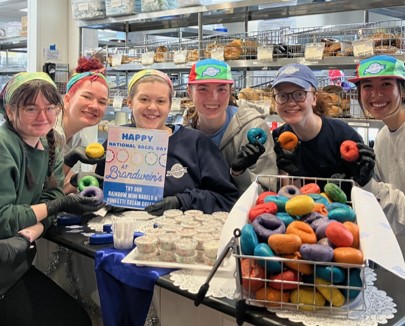
The Brandwein’s team invites customers to celebrate National Bagel Day.
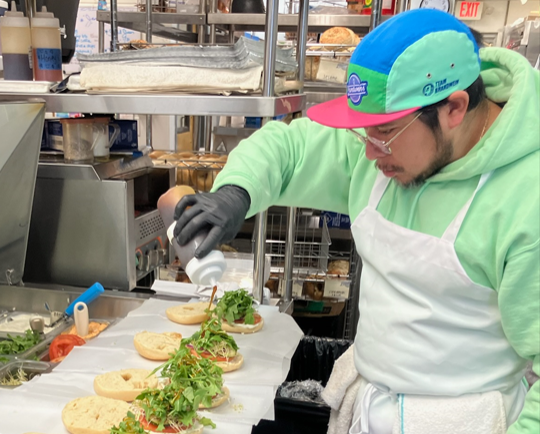
On the prep line, menu items include a wide assortment of sandwiches, deli salads and spreads.
“For me, it was important to use that summer to work in a bagel shop, experience what it was like to get burns up and down my arms and feel the grind—and the—joy of the day,” he said. “I needed to know what it was like to turn the corner and yell out ‘hot sesame!’ I wanted to learn how the operations worked and if I actually liked waking up at 4 o’clock in the morning and staring at a 500-degree oven for eight hours a day. I had done so much research, but I needed to figure out: ‘Am I actually going to do this?’”
With real-world lessons in tow from New York he perfected his bagel recipe, which he wanted to make as authentic as possible. “If I couldn’t give these bagels to my mom, who is a born-and-raised New Yorker from Queens, it wouldn’t work.” It was important to him to honor the classic recipe of New York bagels, which is just five ingredients—flour, water, salt, yeast and barley malt syrup—and a boil-then-bake method that creates a crisp outer shell to protect the airy interior.
Brandwein selects ingredients with the thoughtfulness and detailed discernment of an artisan fully committed to their craft. He sources organic flour locally from Lindley Mills, a tenth-generation specialty flour mill and manufacturing business led in part by fellow Kenan-Flager MBA alumna Caroline Lindley. And while many bagel shops cut corners using brown sugar, Brandwein said he only uses barley malt syrup shipped from a New Jersey distributor—the “kicker ingredient that gives the nutty flavor you really look for.”
Secret ingredient: Connection to community
The attention to detail and quality—and the love and effort placed into the food—help set the business apart, Brandwein said. “Our bagel is a humble product that only has five ingredients, but we think about every ingredient. Every bagel that goes out the door goes to a person in our community, which means it matters.” Beyond culinary components, Brandwein emphasizes a secret sixth ingredient: building connections with customers in the Chapel Hill community.
Brandwein recalls a chance encounter with a customer while he was sitting outside the bagel shop with an employee. “A woman who works at the UNC Eastowne Medical Office Building came up and told me how she’d had an awful day recently. She had forgotten her lunch and was bummed she had to go to the café at the clinic. We had started selling our bagels at Eastowne just a few weeks earlier. She saw our Brandwein’s refrigerator and said, ‘I got the veggie bagel sandwich and the cookie parfait, and it was just what I needed that day.’”
Such experiences encapsulate what Brandwein hopes to achieve with his business: not just making bagels, but also a positive difference. “Our company’s mission is to make peoples’ days a little bit better with good food done well,” he said. “We’re not launching rockets into space or curing diseases, but a good bagel shop is one thing you can hopefully count on. We want to make everyone feel welcome, with a smile and a great bagel that hits the spot.”
#1
bagel in the Triangle region (IndyWeek)
14+
bagel flavors available
50+
people currently employed
Path to impact: Lessons from Brandwein’s Bagels’ entrepreneurial journey
Funding Approach
Brandwein said he took a strategic approach to funding from the beginning. Because he’d worked in investment banking for seven years, he had the means to self-fund his initial bagel pop-up stands as an MBA student. He took a cautious approach to accepting investment dollars in exchange for equity. “Based on the MBA program and my prior experience in finance, I was pretty wary of taking money from people or having a partner who might not be as committed as I am,” he said. “I didn’t want to have to go that route if I didn’t have to.” Beyond his self-funding and early sales revenue, Brandwein received two $10,000 business investment grants from Orange County—the first in 2021 and the second in 2023.
The need for more significant funding came as the business quickly grew. “We saw an opportunity to develop the catering side of the business and, at the same time, had the chance to buy the building behind us where the old Bread and Butter Bakery had been. We also purchased our existing space, connected the two buildings and purchased the parking lot.” To fund the expansion, Brandwein took out a U.S. Small Business Administration loan.
“We spent a lot of time creating the financial memo, explaining the story and reaching out to banks to help them understand where we were going and why this makes sense,” he said. “The SBA debt funding was the lowest cost option and most advantageous for us. And for a company that was only six months old to get a multi-million-dollar loan was a huge moment. I was happy about that source of funding as opposed to taking on additional equity partners.”
Company location
A few early advisors floated the idea of operating virtually, which would have required less overhead cost. “When I was pitching this idea to professors and other entrepreneurs, some advised me to consider operating as a subscription service,” he said. “A physical space is certainly more costly than operating virtually, but having a physical presence meant a lot to me, and I liked the idea of people having a place to go.”
When he needed to determine where that “place to go” would be, he thought long and hard, but ultimately didn’t have to look far. “When it came time to find our building, I probably walked Franklin Street a hundred times,” he said, noting that he was initially concerned about being too far from the downtown epicenter of Franklin and Columbia Streets. “I sat outside the shop (previously Midway Community Kitchen), where we’d already been working to support our bagel pop-ups. What I loved about the location was that it felt like its own experience, while still being a short walk or bike ride from the heart of downtown. It felt like a space where people could come to hang out with ample outdoor seating and people on the move could quickly pull up in their cars and grab their orders without getting stuck in traffic.”
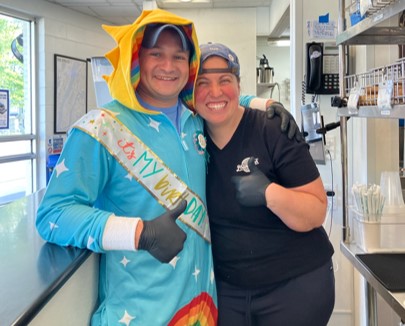
Inside Brandwein’s Bagels, birthdays become a team celebration.
Brandwein’s catering service operates out of the adjoining building, which he acquired not long after opening the original bagel shop. “When the owner of the Bread and Butter Bakery asked if we wanted to buy the building, our shop had only been open a short time,” he said. “But having the chance to stay in our location, while tripling our space to accommodate the catering side of the business and acquiring 13 parking spaces in downtown Chapel Hill was huge. All of those things came together, so we decided to push all the chips in and go for it.”
Despite the physical expansion, the Brandwein retail space doesn’t have much room for meetings. So, the team often gathers at the Innovate Carolina Junction, the university’s innovation hub and coworking space located in downtown off E. Rosemary St. “I love going to the Junction to work, join team or one-on-one meetings, make introductions or connect with other entrepreneurs and share stories,” he said. “The Junction feels like a place that is part of our team and a center point where a lot of creation happens.”
People and talent
Although Brandwein officially launched his business as a single operator, he’s quick to point out that doing so wasn’t a solo endeavor. From business school classmates and professors who shared contacts or showed up to work at bagel pop-ups to local entrepreneurs and restaurant owners who offered invaluable advice, a community of contacts offered constant support.
“Some people keep their ideas quiet, but I learned that you need to talk your idea into fruition,” he said, noting that he reached out to people across the university and town to get advice and help. “What I love about Chapel Hill is that people care about others. People here want you to succeed and will put you under their wing. There were hundreds of people involved in Brandwein’s in some way.”
In terms of early staff, Brandwein hired a kitchen director who knew what to look for in line cooks and how to get suppliers and vendors set up. Today, Brandwein’s staff has grown to nearly 50 team members. He says one of the most pivotal hires was the company’s director of operations.
“We were at a crossroads and had to decide if we were going to run this as a small bagel shop or try to grow into something more significant,” said Brandwein. He called trusted former MBA classmate Melissa Sieffert, who was working in investment banking, and asked if she would consider the role. “We needed to hire someone who had the experience to lead the company, see the big picture, be strategic and drive the company forward.”
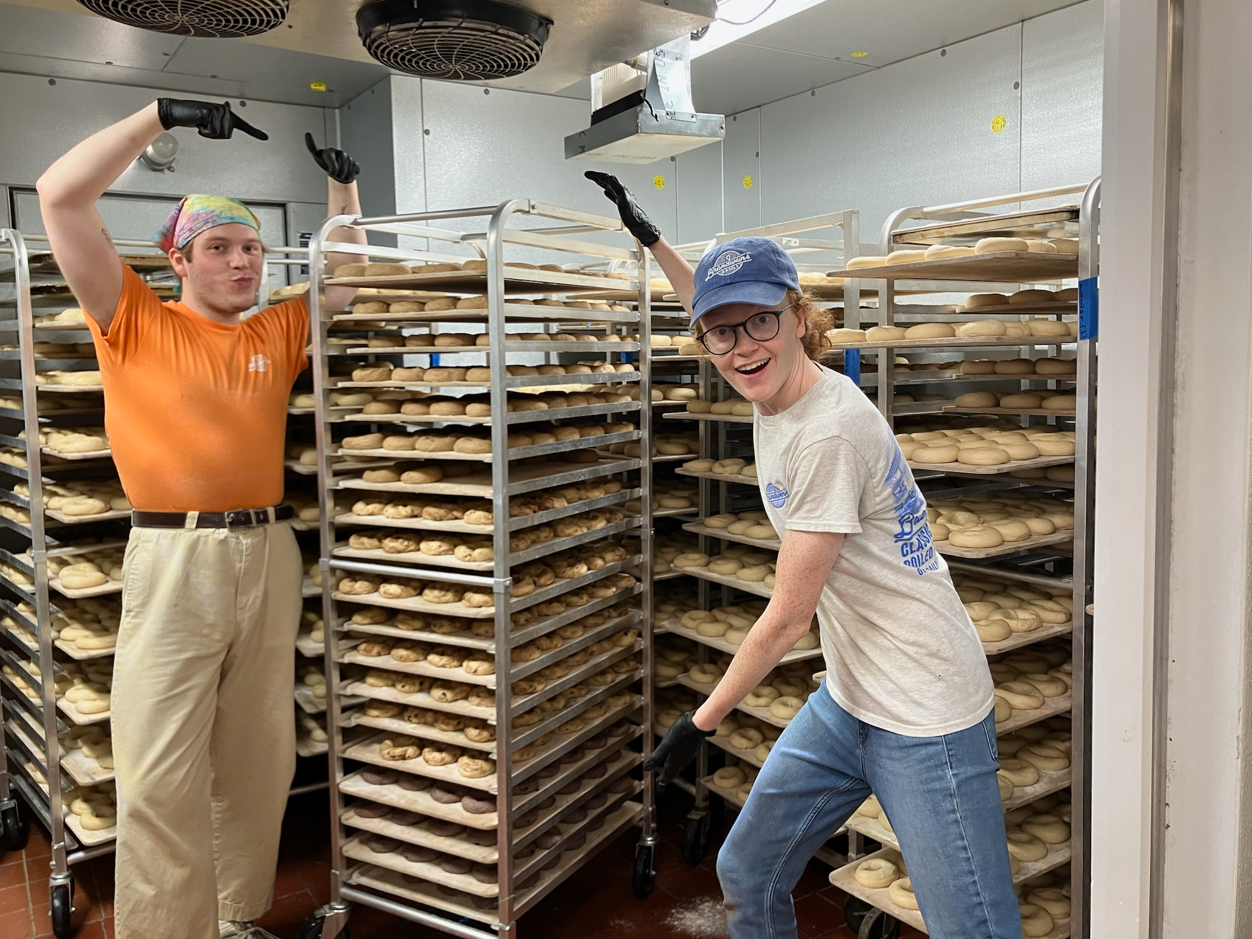
Members of the Brandwein’s kitchen team roll out a fresh batch of bagels – now available in more than 14 flavors.
As the business and staff grew, so did the need to establish infrastructure. “This wasn’t a mom-and-pop thing any longer,” he said. “We needed to set strategy, define our culture, coordinate activity, as well as create career paths for the staff. We needed to start being more like a company.”
Another shift was recognizing the benefit of grooming leadership for the long term. “We slowly learned that the best formula for us is to hire early and have people grow up through our culture, learn everything about the business and get trained by us,” said Brandwein. “We’re trying to focus on organic growth, and it’s been really cool to see team members grow to become team leads, managers and directors. Growing talent organically takes a little longer, but it helps us build a more sustainable, long-lasting company with dedicated team members.”
Entrepreneurial education
For Brandwein, learning the ropes of entrepreneurship has been part academic experience, part real-world journey. While enrolled as an MBA student at Kenan-Flagler Business School, he said he tapped into every entrepreneurial resource the school had to offer. “The courses were a huge help, and I took every entrepreneurship class I could find,” he said. “I was active in the Entrepreneurship Club and also participated in the Adams Apprenticeship, which brought together this idea of being part of a community while you’re creating and building something.”
One class he took while at the business school was the StartupUNC course, which allows students to learn from multiple faculty and meet fellow early-stage entrepreneurs as classmates. Brandwein also took a community-based course taught by Victoria Hudson, Orange County’s environmental health director, about how to start a food business, which coincidentally was held at the former Midway Community Kitchen, now home to Brandwein’s.
Launch Chapel Hill, a startup accelerator formed via a partnership between UNC-Chapel Hill, the Town of Chapel Hill and Orange County, became a focal point. Located downtown in the Innovate Carolina Junction, the accelerator gave Brandwein access to seminars and mentorship. “The centerpiece of it all for me was Launch Chapel Hill because that was the next level up where the company became real,” he said. “I could be around other professionals who were starting their own businesses and learn from entrepreneur-in-residence Scott Maitland, who owns Top of the Hill. Scott really took me under his wing and walked me through the X’s and O’s of opening a restaurant and understanding the community that I was about to be part of.”
From active community participation and contributions through programs such as Fundraiser Fridays (donation days that raise money for local, humanitarian non-profits) and Team Brandwein (a program to recognize UNC Division I athletes’ contribution to the community), Brandwein has been true to his inspiration and mission. The shop has been recognized in numerous ways, including IndyWeek’s Best Bagel in the Triangle in 2022 and 2023 and one of Chapel Hill Magazine’s Best Breakfast and Best Catering companies in 2022 and 2023. Brandwein was honored in 2023 by the Chamber for a Greater Chapel Hill-Carrboro as the Young Professional of the Year.
“It’s been an incredible ride thus far, and I’ve loved every single minute of it,” Brandwein said. “I’m so grateful for where we are and so excited to see where things go.”
Want to learn more entrepreneurial lessons from Alex Brandwein?
Register to hear him speak during his Founders Forum talk at the Innovate Carolina Junction on Thursday, March 7. The interview will be moderated by Tim Flood from the UNC Kenan-Flagler Business School and Launch Chapel Hill.
Want to learn about UNC-affiliated startups that turn research and ideas into impact?
Check out more stories from Innovate Carolina’s Idea-to-Impact series. You’ll discover insights from inventors and entrepreneurs who are leading startup companies and innovative ventures that create human and economic impact in North Carolina and beyond.

 | UNC-CH
| UNC-CH
